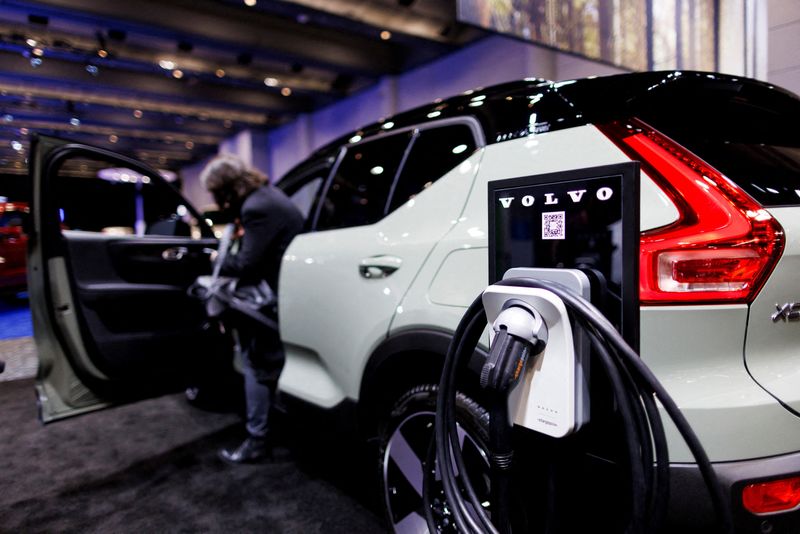By Marie Mannes and Nick Carey
(Reuters) -Swedish carmaker Volvo (OTC:) Cars cut its margin and revenue ambitions for the second time in a year on Thursday, a day after abandoning its electric-vehicle-only target by 2030, citing the impact of tariffs and a decline in demand for electric vehicles.
Declining demand for electric cars, partly due to a lack of affordable models, and the effects of EU, US and Canadian tariffs on electric cars made in China, have made market conditions increasingly difficult for automakers.
Volvo Cars, which has a majority stake in China’s Geely, lowered its operating profit margin target excluding joint ventures and associates from over 8% to 7-8%.
It also scrapped a sales target of 550 billion to 600 billion Swedish crowns ($53.5 billion to $58.4 billion) and instead said it expected to outgrow the premium car market.
This is the second time in a year that Volvo has rolled back margin and revenue targets, after deviating in January from mid-decade targets for annual EBIT of 8-10% and annual sales of 1.2 million cars. first announced in 2021. .
While the EV maker has prided itself on its unwavering confidence to achieve full EV sales by 2030, it decided on Wednesday to follow other automakers and now aims to make 90% of its sales from a mix of plug-in vehicles by then -in hybrids and cars. EVs.
“We have seen that this transition is going to take a little longer than we initially anticipated when we first achieved these goals,” CEO Jim Rowan told Reuters.
“As I have said before, business is not a game of perfection, it is about continuous progress and adaptation,” he said in a statement on Thursday.
Rowan said the removal of some subsidies has contributed to the EV slowdown.
Christina Bu, head of the Norwegian EV Association, said she was not surprised by Volvo’s decision to temper its near-term electrification targets.
“They follow quite a few other automakers who have made similar statements before, so that’s not too surprising,” Bu said.
She reiterated the need for strong, long-term political support for the EV transition. “Strong policies are still needed to make this transition work,” she told Reuters.
In releases ahead of a planned investor event in Gothenburg, Volvo said that starting with its electric flagship EX90 – which the Swedish carmaker will start delivering to customers this month – it will have a single ‘technology stack’ for all car models.
Volvo Cars separately said it will use a single software system for all future models, backed by Nvidia (NASDAQ:) chips, and will rely on “megacastings” – massive presses to create large, one-piece aluminum vehicle floors – to reduce the cost of electric lower cars.

It also reported on Thursday a 3% year-on-year increase in car sales in August.
($1 = 10.2815 Swedish Krona)


